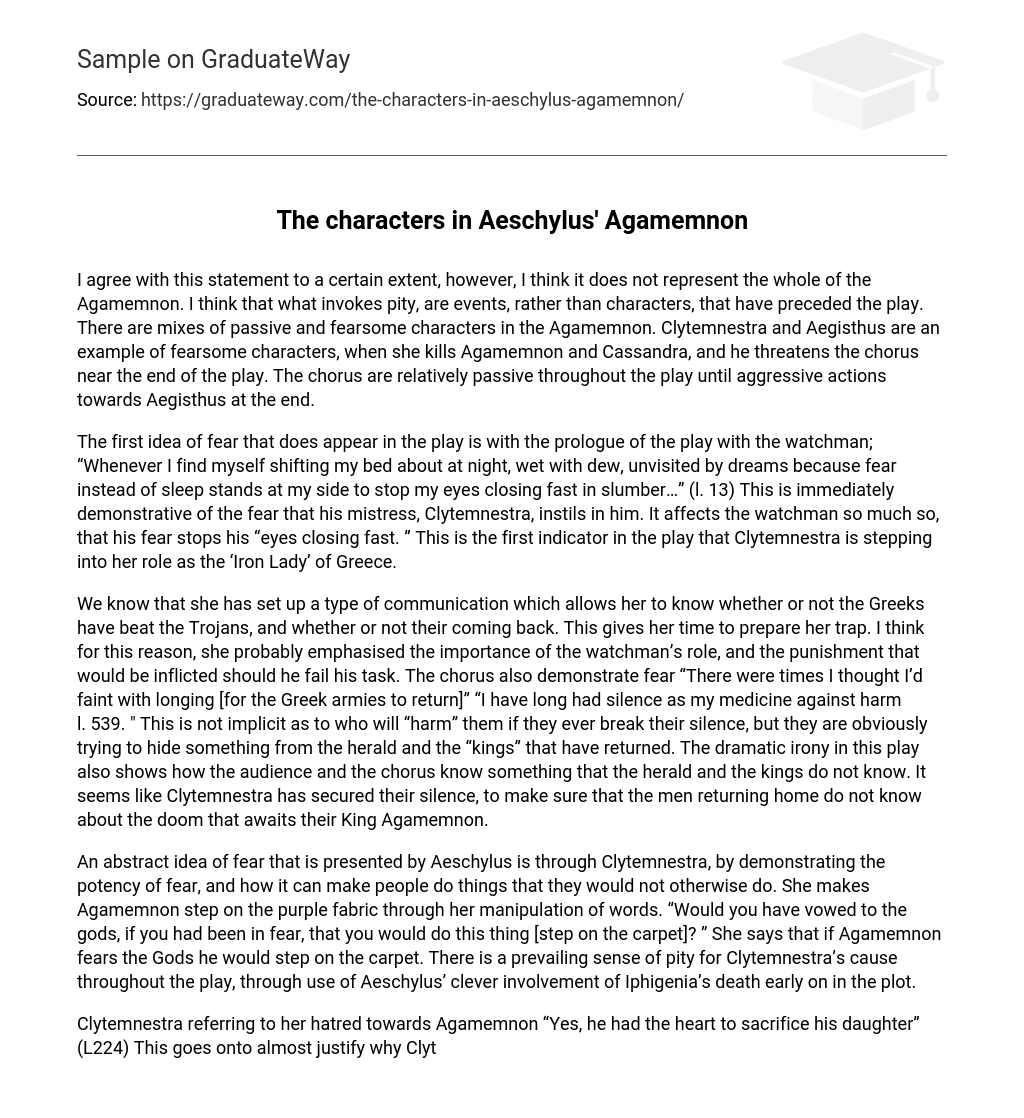Though I partially agree with this statement, I do not fully believe it captures the true essence of Agamemnon. In my perspective, it is the events preceding the play that elicit pity rather than the characters themselves. The play showcases a combination of both passive and formidable characters. For example, Clytemnestra and Aegisthus embody the latter as Clytemnestra murders Agamemnon and Cassandra, while Aegisthus poses a threat to the chorus near the end of the play. Throughout most of Agamemnon, the chorus remains relatively passive but becomes aggressive towards Aegisthus in its concluding moments.
The initial manifestation of fear in the play is seen in the prologue with the watchman, who states, “Whenever I find myself shifting my bed about at night, wet with dew, unvisited by dreams because fear instead of sleep stands at my side to stop my eyes closing fast in slumber…” (l. 13). This demonstrates the fear that Clytemnestra, his mistress, instills in him. It greatly affects the watchman, preventing him from falling asleep. This serves as the first indication in the play that Clytemnestra is assuming her role as Greece’s formidable leader, known as the ‘Iron Lady’.
It is known that she has established a form of communication to receive updates on the outcome of the Greek versus Trojan conflict and their return. This allows her to have time to prepare her trap. It is believed that she emphasized the importance of the watchman’s role and the severe consequences if he fails. The chorus also expresses their fear and desire for the Greek armies’ return, but they have chosen silence as protection against harm. It is unclear who would cause harm if they break their silence, but they are clearly hiding something from the herald and the returning kings. The play reveals dramatic irony, as the audience and chorus possess knowledge unknown to the herald and kings. It appears that Clytemnestra ensured their silence to prevent the returning men from knowing about the impending doom for their king, Agamemnon.
Aeschylus demonstrates an abstract idea of fear through Clytemnestra in his play. He shows how fear can be powerful enough to compel people to act in ways they wouldn’t ordinarily. Clytemnestra manipulates words to make Agamemnon step on the purple fabric. She questions whether he would have made a vow to the gods to do this if he had been afraid. She suggests that if Agamemnon fears the gods, he will step on the carpet. A sense of pity for Clytemnestra’s cause prevails throughout the play, thanks to Aeschylus’ clever inclusion of Iphigenia’s early death in the plot.
Clytemnestra expresses her hatred towards Agamemnon, indicating that he had the audacity to sacrifice their daughter (L224). This serves as a partial justification for Clytemnestra’s action of killing him. Furthermore, there is a feeling of sympathy towards Cassandra, who is Agamemnon’s concubine. She appears to suffer unintended consequences as a result of Agamemnon’s murder. The Chorus also shares this pity for Cassandra, expressing their intention to treat her gently (L1069) and wishing her peace (L1258). They depict her as being entangled in the intricacies of war and powerless to alter her fate, which she can foresee.
Overall, it can be concluded that fear is dominant in the play. Clytemnestra instills fear in various characters, such as the watchman, the chorus, and even her own husband. Aeschylus also subtly incorporates a theme of pity from the beginning, which justifies why Clytemnestra acts out of fear. The play’s sense of pity is further emphasized by the unnecessary death of Cassandra, which leaves a lasting impact on the audience.





